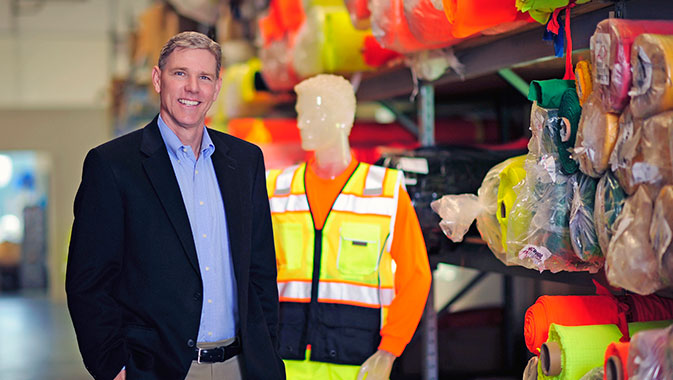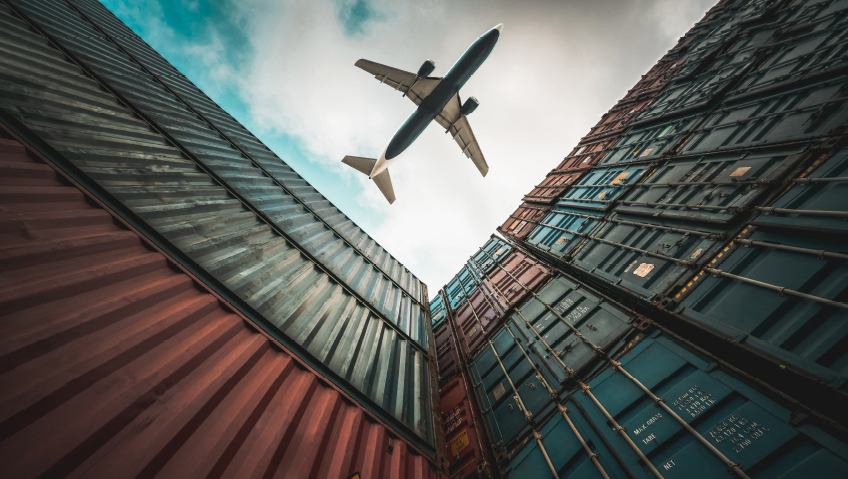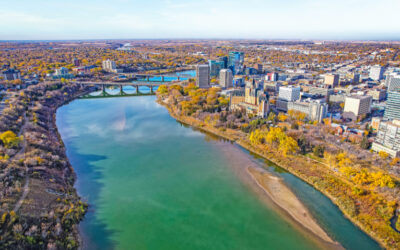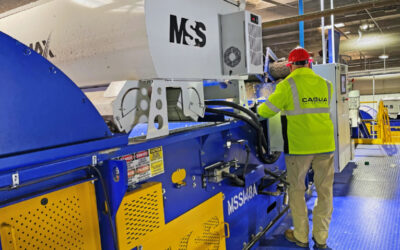For over 40 years, M.L. Kishigo has designed safety and high-visibility apparel built to last. As the industry leader of high-visibility apparel, the company continues to design and develop products dedicated to ensuring the safety of workers across a variety of industries. We spoke with CEO Greg Hayward to find out more about the company and its plans for the future.
~
“Unlike many companies, our products are made and designed right here in America,” Hayward says. “We make our products in our facility and send a lot of inventory overseas. Whether a product is made in the U.S. or overseas, the expectations of the customer should be the same. Our mantra is committed toward providing the best garments in the industry and providing innovative designs.”
Headquartered in Santa Ana, California just outside of Los Angeles, M.L. Kishigo was founded by CEO Loren H. Wall in nearby Westminster in 1971. Since its inception, the company has been dedicated to specializing in all manner of high visibility apparel including vests, pants, jackets, accessories and caps. M.L. Kishigo got its start as a safety distributorship and was named after the founder’s wife, Mary Lou Kishigo.
“They bought one sewing machine and a customer asked to them to make a vest for them,” shares Hayward. “We started from the ground up.”
M.L. Kishigo has since expanded into designing industrial, clean room and fire-resistant apparel. The company has been outfitting municipalities, cities, states and private industry with durable, compliant and customized apparel to meet their specialized needs. M.L. Kishigo is known for its quality craftsmanship and materials and its apparel products are made to withstand the most rugged conditions, with consistent sizing and shapes on offer for every order.
As the standards of safety have increased over the years, M.L. Kishigo has embraced developing apparel to meet these standards and even exceed them. Recently, the Occupational Safety & Health Administration (OSHA) adopted requirements for fire-retardant garments and Hayward says that his company has been on board with making the necessary changes to meet these requirements.
“Overall, the [apparel] industry is growing and changing,” he explains. “We’re driven by the ‘anti-standard’ introduced in 1999 and that is going into its newest edition, updating for 2015. Agencies adopting new standards has been a primary driver of the business so we’re in a good spot. People are looking for creative garments and other industries are adopting too.”
Due to its long history in the industry, M.L. Kishigo has been instrumental in setting the standard for high-visibility wear and fire-retardant products. “We worked with some of the experts in the industry with our fire-retardant products,” says Hayward. “We hired consultants on new standards and feel that we’re an industry expert too.”
One example of this is M.L. Kishigo’s role in the development of the American National Standards Institute (ANSI) ISEA 107 and 207 high-visibility standard. The American National Standard ANSI/ISEA 107-2010, High-Visibility Safety Apparel and Headwear is an industry consensus standard that specifies requirements for apparel and headwear capable of visually signaling the user’s presence. It was developed by the International Safety Equipment Association (ISEA) and first published in 1999. Hayward personally chaired the board to help define these standards and M.L. Kishigo has been involved in setting these standards. Since then, the standard has been recognized and compliance mandated by federal, state and local authorities as well as private industry entities. Today, the U.S. Department of Transportation’s Federal Highway Administration (FHWA) requires nearly all workers in or near a highway right-of-way to wear garments that comply with the standard.
The ANSI ISEA 107 standard details the performance specifications for materials used in the construction of high-visibility garments. Specific test procedures are included for background materials, retroreflective, and combined-performance materials. The standard also provides criteria for apparel design and addresses labeling and use instruction requirements.
M.L. Kishigo has been a major supplier of choice for large distributors in the industry. While it does not sell directly to people, it is the #1 vendor for many distributors. “We’re one of the foremost experts in the field, people come to us for standards and knowledge.”
While the company has a lot of domestic production, one challenge has been finding the proper balance between manufacturing overseas or domestically. “It is difficult to find the right mix,” acknowledges Hayward. “Is the American worker willing to pay additional costs for domestic made apparel when imports are less expensive? We also must determine who to hire domestically or internationally and really determine if a U.S. worker willing to pay for the apparel and how to balance that with right number of employees,” he explains.
“We have a domestic facility, one of the few that make garments in America; when they do business with us, they have that option if that is important to them. The cost savings with imported product is important – but fueling our own, I feel strongly about that. We can meet those needs, whether international or domestic.”
He also says that there are competitors getting into the business with little or no experience – and a lack of compliance – and that can be an issue for M.L. Kishigo. “Some people that are selling the product probably don’t have the documentation to support their claims for visibility and don’t know what the requirements are,” Hayward says. “A large group of companies comply with the standard but still have to compete with people cutting corners and not complying with standards.”
Nonetheless, M.L. Kishigo continues to develop products that maintain the high standards the team was instrumental in developing. “We have a very strong commitment to meeting the standard and ensuring our customers are getting garments. Quality Control is important. Tolerances are often overlooked in the apparel industry, so we constantly examine dimensions, length, width, and sewing construction. We have strong policies to meet expectations.”
Another way M.L. Kishigo combats its lower quality rivals is through the relationships it builds with the companies it distributes to. “Our relationship with our distributors and customers is very good,” Hayward says. “There are some suppliers that won’t do business with us because we are very particular about our standards. We have long-term commitments with suppliers who know our expectations. The quality for our domestic goods is good to begin with and suppliers for our imported products have strong relationships because we have high tolerances. We wouldn’t have been in business for as long as we are with distributors without being good; they look to us as a leading seller. We offer something different and we lead rather than copy – and our distributors appreciate that.”
Just some of the products that M.L. Kishigo offers include its Brilliant series of safety vests, designed to outline the human form. These products feature iridescent colors that are reflective both day and night, made of polyester mesh and silver laminated reflective material to improve low light visibility. “The Brilliant Series has been very successful,” shares Hayward. “It provides an additional retroreflective human outline for workers so motorists can see them as humans, not a traffic device.” The Brilliant Series is available either in Lime or Orange colors.
Another premium line that has been successful for M.L. Kishigo is the Black series, which boasts the features of the Brilliant line plus two lower outside expandable cargo pockets with adjustable flaps and grommets.
In terms of future expansion, the team plans to broaden its distribution nationwide. To this end, there are plans to open a facility in West Virginia to facilitate quicker delivery to the East Coast. “The West Virginia warehouse will service distributors at a moment’s notice. That is important to our customers. As we’re moving forward, we’re extremely focused on bettering customer experience, which is extremely important to us. We have a talented team of customer service people that will help with this… At this point, our objective is service oriented.”
Since 1971, M.L. Kishigo has grown to become an industry leader in providing high-visibility apparel for a number of industries. Hayward says that the company’s high standards and top quality speak for themselves.
“We want to ensure that customers are experienced in building high-visibility garments and meeting the standards,” Hayward says. “Some of our biggest fears come from buying products from less-experienced vendors that are not high-quality. We want workers to look their best and we different designs that suit different styles. We may be in an industry that is fairly generic, but we make our clients look different – nicer as well as being safe. Buy from a legitimate player and consider how to make workers stand above the rest with our outfits.”













